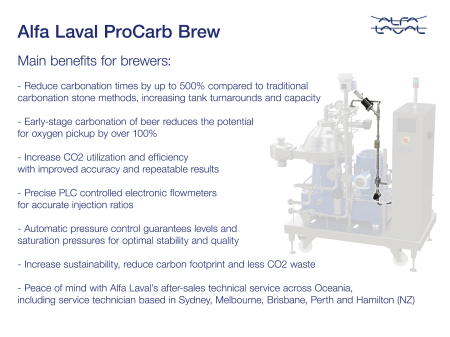For 10 years Sydney’s The Grifter Brewing Co have been crafting beers that people have savoured and sought out, both locally and well beyond their Marrickville postcode.
Up until recently they had been brewing the likes of their flagship Pale Ale and Serpents Kiss Watermelon Pilsner in Uni-tanks and force carbonating them with a carbonation stone – a process of getting bubbles in beer they had pretty dialled in.
But the move to install Alfa Laval’s Brew 250 centrifuge and ProCarb inline carbonation feature was a natural next step to “invest in equipment to do things more efficiently” as they grew.
“The decision to get a centrifuge originally came down to us wanting to get the most out of the stainless that was already on site,” co-founder Glenn Wignall (pictured above) said. “Space is a premium when you’re brewing this close to the city, so you’ve really got to make the most of it. Previously we were putting down more tanks to increase capacity but as we matured, we also felt it was time to start investing in equipment to do things more efficiently, with a focus on quality.”
Glenn now sees their Brew 250 as one of their key employees due to its efficiencies and finesse. Separating solids rapidly via a centrifuge allows them to transfer a recently chilled tank of beer, with high amounts of yeast and hops in suspension, into a keg or can within the hour. The Alfa Laval centrifuge’s hermetically sealed design also means dissolved oxygen (DO) pick-up when processing their beer is next to nothing. Being able to achieve those results without the need for deaerated water, Glenn said, “is a huge bonus”.
And when you couple all that with being able to carbonate the beer at the same time as it passes through the centrifuge means The Grifter are saving space and time while producing clearer beer with increased stability.
“We are now able to produce a more consistent, higher quality product at a faster rate, that stays fresher longer, and we believe this is paramount to being the best brewery you can be,” Glenn added.




“Carbonating through a stone is quite a long process in itself. And on top of that it can require a bit of attention from the team, taking them away from other tasks. It’s great to be able to start a run, open the ProCarb feature and just set and forget.
“Another bonus with the nature of injecting the CO₂, as opposed to bubbling it up through the beer, is that we’re not scrubbing off any hop volatiles in the process – plus also saving CO₂.”
The integrated ProCarb inline carbonation feature is mounted directly at the inlet of The Grifter’s centrifuge skid, meaning there is hardly any increase to the footprint, freeing up precious space in the brewery for other equipment.
The process of carbonating inline begins when moving unfinished beer from the fermenter into the bright tank. By taking a reading of the CO₂ saturation in the beer post-fermentation you’re able to calculate how much more needs to be added to achieve the desired specification for a particular beer. Via direct injection, the ProCarb technology automatically controls the CO₂ dosing based on the incoming beer flow measured by an integrated MAG flowmeter. The gas is injected into the product stream and when it enters the environment where solids are separated, the strength of the gravitational force means the CO₂ can easily be absorbed into the liquid.
So, in short, on one side of the centrifuge you have under-carbonated, murky beer going in and on the other side, bright carbonated beer coming out.
“We chose Alfa Laval because we felt their technology and design features were best suited to our needs,” Glenn said. “We were looking for quality, speed and reliability and I think we’ve managed to tick all those boxes. We’re able to speed up our production without sacrificing quality which is going to help us to confidently supply our growing customer base, making the investment worthwhile.”

Alfa Laval’s Food & Beverage Manager Paul Cirillo said the newly launched ProCarb inline carbonation feature is a fantastic additional option now available for craft brewers on their Brew centrifuge modules which inherently perform beer clarification, or polishing duties, with extremely low oxygen pick-up while maintaining aroma retention.
“This brings together two technologies: clarification and carbonation which are vital to a brewery’s ongoing search to reduce processing times while improving the consistency and quality of beer produced,” Paul said.
“ProCarb utilises CO₂ gas injection technology and the high G-forces within the centrifuge to break down the gas bubbles which allows the beer to absorb and achieve the saturation of the gas, ensuring precise and stable carbonation efficiently, instantly and completely.
“The automated technology allows brewers to accurately dial in how much carbonation they require for each beer type based on the level they have in their fermenter and their desired final carbonation target in the bright beer tank prior to processing.”
The ProCarb module is available on Alfa Laval’s Brew 20, Brew 80 and Brew 250 centrifuges and can come already integrated with a new machine or retrofitted in the future.
Head here for more information.
This is sponsored content. To find out more talk to the Beer & Brewer sales manager.





